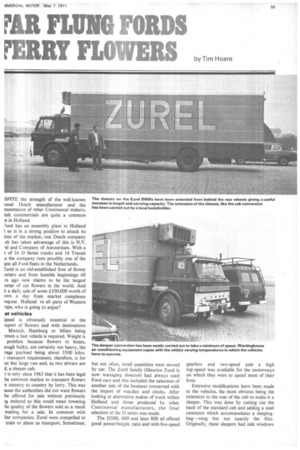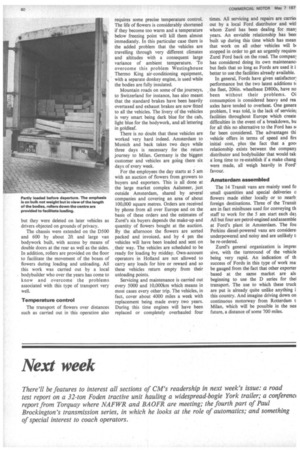PAR FLUNG FORDS
Page 61

Page 62

If you've noticed an error in this article please click here to report it so we can fix it.
PERRY FLOWERS by Tim Hoare
SPITE the strength of the well-known ional Dutch manufacturer and the resentation of other Continental makers, Link commercials are quite a common it in Holland.
Ford has an assembly plant in Holland so is in a strong position to attack its Lion of the market; one Dutch company ch has taken advantage of this is N.V. -el and Company of Amsterdam. With a t of 16 D Series trucks and 14 Transit is the company runs possibly one of the ;est all-Ford fleets in the Netherlands. t,urel is an old-established firm of flower orters and from humble beginnings 60 rs ago now claims to be the largest orter of cut flowers in the world. And h a daily sale of some £.100,000 worth of vers a day from market complexes nig out Holland to all parts of Western .ope, who is going to argue?
St vehicles
ipeed is obviously essential in the tsport of flowers and with destinations Munich, Hamburg or Milan being mon a fast vehicle is required. Weight is problem because flowers in boxes, Lough bulky, are certainly not heavy, the rage payload being about 3500 kilos. ; transport requirement, therefore, is for tst but large van and, as two drivers are d, a sleeper cab.
t is only since 1963 that it has been legal he common market to transport flowers n country to country by lorry. This was ause, the authorities did not want flowers be offered for sale without previously ig ordered as this could mean lowering he quality of the flowers sold as a result waiting for a sale. In common with ilar companies, Zurel were compelled to train or plane as transport. Sometimes,
but not often, small quantities were moved by car. The Zurel family (Maurice Zurel is now managing director) had always used Ford cars and this included the salesmen of another side of the business concerned with the import of watches and clocks. After looking at alternative makes of truck within Holland and those produced by other Continental manufacturers, the final selection of the D series was made.
The D500, 600 and later 800 all offered good power/weight ratio and with five-speed gearbox and two-speed axle a high top-speed was available for the motorways on which they were to spend most of their lives.
Extensive modifications have been made to the vehicles, the most obvious being the extension to the rear of the cab to make it a sleeper. This was done by cutting out the back of the standard cab and adding a steel extension which accommodates a sleepingbag—snug but not exactly the Ritz. Originally, these sleepers had side windows but they were deleted on later vehicles as drivers objected on grounds of privacy.
The chassis were extended on the D500 and 600 by about 2ft and large van bodywork built, with access by means of double doors at the rear as well as the sides. In addition, rollers are provided on the floor to facilitate the movement of the boxes of flowers during loading and unloading. All this work was carried out by a local bodybuilder who over the years has come to know and overcome the problems associated with this type of transport very well.
Temperature control The transport of flowers over distances such as carried out in this operation also requires some precise temperature control. The life of flowers is considerably shortened if they become too warm and a temperature below freezing point will kill them almost immediately. In this particular case there is the added problem that the vehicles are travelling through very different climates and altitudes with a consequent large variance of ambient temperature. To overcome this problem Westinghouse Thermo King air-conditioning equipment, with a separate donkey engine, is used while the bodies are fully insulated.
Mountain roads on some of the journeys, to Switzerland for instance, has also meant that the standard brakes have been heavily overtaxed and exhaust brakes are now fitted to all the vehicles. The livery of the vehicles is very smart being dark blue for the cab, light blue for the bodywork, and all lettering in goldleaf.
There is no doubt that these vehicles are worked very hard indeed. Amsterdam to Munich and back takes two days while three days is necessary for the return journey to Milan. Germany is the biggest customer and vehicles are going there six days of every week.
For the employees the day starts at 5 am with an auction of flowers from growers to buyers and exporters. This is all done at the large market complex Aalsmeer, just outside Amsterdam, shared by several companies and covering an area of about 100,000 square metres. Orders are received by phone from all over Europe and on the basis of these orders and the estimates of Zurel's six buyers depends the make-up and quantity of flowers bought at the auction. By the afternoon the flowers are sorted packed and invoiced, and by 4 pm the vehicles will have been loaded and sent on their way. The vehicles are scheduled to be ready for loading by midday. Own-account operators in Holland are not allowed to carry any loads for hire or reward and so these vehicles return empty from their unloading points.
Servicing and maintenance is carried out every 5000 and 10,000km which means in most cases every other trip. The vehicles, in fact, cover about 4000 miles a week with replacement being made every two years. During this time engines will have been replaced or completely overhauled four times. All servicing and repairs are curie( out by a local Ford distributor and witl whom Zurel has been dealing for man] years. An enviable relationship has beei built up during this time which has mean that work on all other vehicles will b stopped in order to get an urgently require( Zurel Ford back on the road. The compan; has considered doing its own maintenanci but feels that so long as Fords are used it i better to use the facilities already available.
In general, Fords have given satisfactor: performance but the two latest additions t( the fleet, 206in. wheelbase D800s, have no been without their problems. Oi consumption is considered heavy and rea axles have tended to overheat. One genera problem, I was told, is the lack of servicin; facilities throughout Europe which create difficulties in the event of a breakdown, bu for all this no alternative to the Ford has s, far been considered. The advantages thi vehicle offers in terms of speed and firs initial cost, plus the fact that a goo, relationship exists between the company distributor and bodybuilder that would tak a long time to re-establish if a make chang were made, all weigh heavily in Ford' favour.
Amsterdam assembled The 14 Transit vans are mainly used fo small quantities and special deliveries c flowers made either locally or to nearb foreign destinations. Three of the Transit are in fact minibuses used for conveying th staff to work for the 5 am start each day All but four are petrokengined and assemble at Ford's plant in Amsterdam. The fou Perkins diesel-powered vans are considere underpowered and noisy and are unlikely t be re-ordered.
Zurel's general organization is imprw sive, with the turnround of the vehicle being very rapid. An indication of th success of Fords in this type of work ma be gauged from the fact that other exporter based at the same market are als beginning to use the D series for thei transport. The use to which these truck are put is already quite unlike anything i this country. And imagine driving down on continuous motorway from Rotterdam t Milan, which will be possible in the nea future, a distance of some 700 miles.










































































































































































































